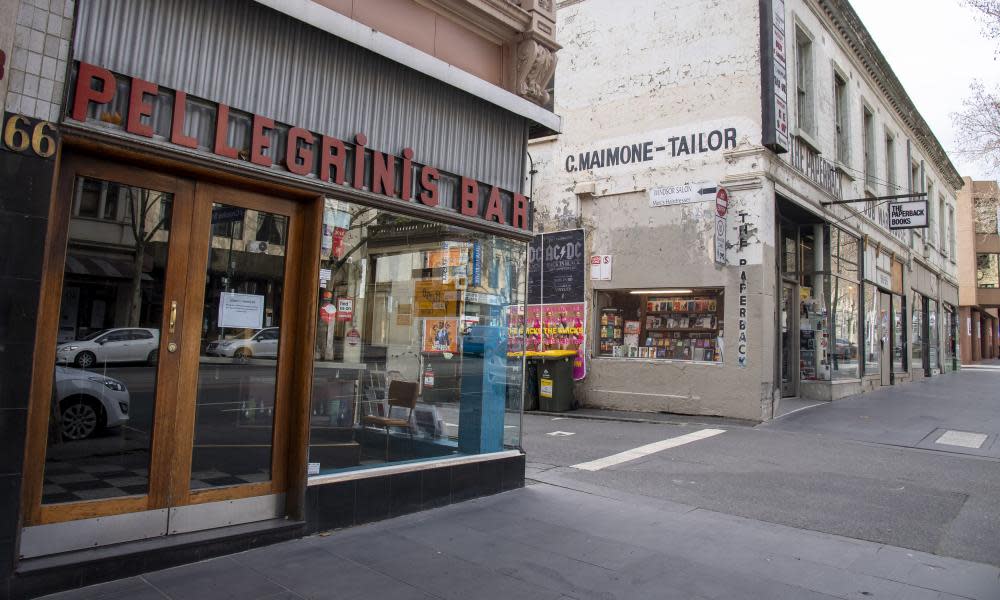Businesses hit by new Victorian Covid restrictions fear being thrown off jobkeeper scheme

Companies hit by sweeping new restrictions in Victoria that came into force this week risk being thrown out of the federal jobkeeper support scheme unless the rules are changed, business leaders say.
They say this will put more jobs at risk in a state economy that is already set to be devastated by the new coronavirus lockdown, making it difficult for employers to keep people on in the run-up to Christmas.
While the business lobby is hopeful the prime minister will change the rules, on Thursday Scott Morrison stopped short of committing to action, saying instead that he and the treasurer, Josh Frydenberg, were “considering some further issues around jobkeeper” and lauding the “fantastic” and “tremendous” economic positions enjoyed by the other states and territories.
Related: Business groups fear Victoria's Covid-19 restrictions will disrupt national supply chains
Sectors that saw a glimpse of economic sunshine in June when restrictions were lifted in Victoria are at risk even though they are set to see revenue plummet under the strict new restrictions, which have forced many businesses to close their doors and severely restricted the operations of others.
Under rules announced by the Morrison government late last month when jobkeeper was extended, at a reduced rate, to continue to receive payments past the end of September, companies will need to show a fall in revenue in both the three months to the end of June and the three months to the end of September.
This means businesses sectors that saw a significant bump in income in June risk flunking out of the program, even as they hunker down against Victoria’s six-week economic freeze.
“The businesses that did the right thing and did well won’t qualify,” the chief executive of the Council of Small Business Organisations Australia, Peter Strong, said.
He said he was hopeful Morrison would take account of Victoria’s plight and fix the rules.
“We need the changes because businesses need to plan,” he said.
Geoff Gwilym, the chief executive of the Victorian Automotive Chamber of Commerce, said his members, car dealers, were at risk of being caught in a double bind because they had to show a higher level of revenue decline due to their size.
Because cars are expensive, revenue can be very high – but profit margins can be as slim as 1%, Gwylim said.
Big businesses have to show a 50% drop in revenue but he said this should be reduced to 30%.
He said car dealers enjoyed a rush of trade when restrictions were lifted in June due to government stimulus measures including an instant asset tax write off for businesses, people drawing down their superannuation, and some part-time workers getting a wage increase due to a quirk in the jobkeeper system.
“There was also a huge movement of people who didn’t want to get on public transport,” he said. “They all thought they were going back to work in August.
“It gave you a peak in one month that could mean that your three-month turnover isn’t 50% less than the previous three months.”
Craig Whatman, a tax partner at Pitcher Partners, said the federal government should move from requiring two consecutive bad quarters to allowing averaging over the whole six months.
He said another problem businesses were facing was that while in the first round of jobkeeper businesses were allowed to use projections of their revenue to qualify for the payment, this time around the government was demanding actual figures.
This would make planning difficult, he said.
“For some smaller companies that means uncertainty about whether they’ll be able to employ people in the three months leading up to Christmas,” he said.
Asked on Thursday if the economy needed more stimulus due to Victoria’s dive back into heavy restrictions, Morrison said the cabinet expenditure review committee was “meeting constantly and the treasurer and I are considering some further issues around jobkeeper as I said we would be, and the treasurer will make more announcements about that”.
He said Victoria’s situation was “devastating for the Victorian economy but also the national economy”.
Related: Victoria lockdown to push Australia unemployment to 10% and cost national economy up to $12bn
“But let’s remember, seven out of eight states and territories are in a fantastic position, a tremendous position,” he said.
He pointed to zero new coronavirus cases in Queensland (Victoria recorded 471) and “only around a dozen cases” in NSW.
“The NSW result, the result in other states, do fill me with confidence,” he said.
The Victorian premier, Daniel Andrews, said he was in constant dialogue with Morrison over federal government policy, including on jobkeeper.


